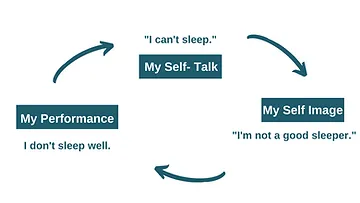If you think you won't sleep well, then you won't.
Your negative thoughts are sabotaging your sleep.
If you’ve struggled to sleep for any period of time (weeks, months, years, decades), I bet you don’t have many positive thoughts about sleep.
Of course you want sleep. But your brain does not have a positive association with it.
Do these sound familiar?
I don’t know if I'll sleep tonight.
I’m so tired.
I’m tired of not sleeping.
What's wrong with me?
Why can’t I sleep like a normal person?
Please let me just have one good night tonight.
I’m so sick of not being able to sleep.
It’s not fair-my husband/wife/partner falls asleep immediately.
What have I done wrong? Why is the universe/God punishing me?
I’m not going to be able to function tomorrow if I don’t sleep.
Good sleepers don’t have any of these thoughts. (Good sleepers don’t think much about sleep at all!)
You have to change these thoughts to sleep better. These thoughts make you feel anxious, out of control, worried, and desperate and as you know you need to feel calm and relaxed to sleep easily.
Psychologists call this the self-feedback loop. Your self talk (I can't sleep) leads to your self image (I'm not a good sleeper) leads to your performance (I don't sleep well). And on and on it goes.
Unfortunately, people tend to be the worst judges of how much sleep they are actually getting. Studies show that many insomniacs overestimate the time it takes them to fall asleep and also overestimate the amount of time spent awake in the middle of the night. One study at the Stanford University sleep clinic measured the sleep of 122 insomniacs who spent the night in the sleep lab. On average, these individuals overestimated the time it took them to fall asleep by 30 minutes and underestimated total sleep time by one hour.
Insomniacs often think they are awake when they are in this second stage of sleep, Gregg Jacobs writes in Say Goodnight To Insomnia. Stage Two is a very light state of sleep. If I were to wake you when you were in this stage, there is a fifty percent chance that you would tell me you weren’t even sleeping yet. This means that at least part of the time insomniacs are sleeping is not registering as full sleep to them. They will wake up in the morning, think back and tell themselves that they were awake most of the night. This contributes to the negative self-talk about sleep and the quality of the night that they had.
We humans tend to focus on the negative things that happen to us, which is called the negativity bias. This bias served your ancestors well to remember the one poisonous plant that could kill them out of ten that were edible. But in modern times focusing on one criticism instead of the ten compliments you got during the day doesn’t boost your self-esteem. It’s the same with sleep. If you’re like I was, you’re probably telling everyone who will listen how poorly you slept. All your negative thoughts and talk about your sleep reinforce each other and keep you stuck in that loop.
When you think about it, lying in bed is actually a luxurious thing to do. You’re warm, comfortable and relaxed. Nothing is expected of you. When you aren’t sleeping, it’s easy to forget the relaxing part. Instead your worry is about how you’re going to function the next day. That stress causes your body to release cortisol which then suppresses melatonin and sabotages your sleep.
I haven’t slept well many times when I’ve had a speaking engagement the next day. Of course, all I want is a good night’s sleep so I can perform at my best. But it doesn’t always happen. Guess what? I always do just fine. Even though I may be tired, adrenaline kicks in making me alert and on my game. So it’s important to keep in mind that your next day won’t be ruined and that one bad night of sleep isn’t the end of the world.
I’m sure you’re eager to find out how to get out of the negative feedback loop. Here are the 3 steps to change your mindset so that you become a great sleeper again:
Step #1
Start to observe your thoughts and what you say to others about your sleep without judgement. For the next few days, write down in a journal or on your phone when you think about how tired you are or tell others about your poor sleep.
Step #2
After you’ve become more aware of your thoughts, when you catch yourself thinking negative thoughts about your sleep or that you’re tired, switch those to positive thoughts. Instead, think something like:
- I will sleep better, no matter what.
- I have slept well before, and I can do it again.
- No matter what happens tonight, I will still be able to function well tomorrow.
Also, don’t talk negatively about your sleep to others. If you catch yourself, then stop and change the subject.
When you feel tired during the day, ask yourself what you need. You may need a 10 minute walk in the sunshine, a power nap, a quick break or food if you’re hungry.
Step #3
Come up with your own sleep mantra to say at bedtime or if you wake up in the middle of the night. Telling yourself “I’m sleeping” or “I love sleep” will help you stay positive and relaxed.

